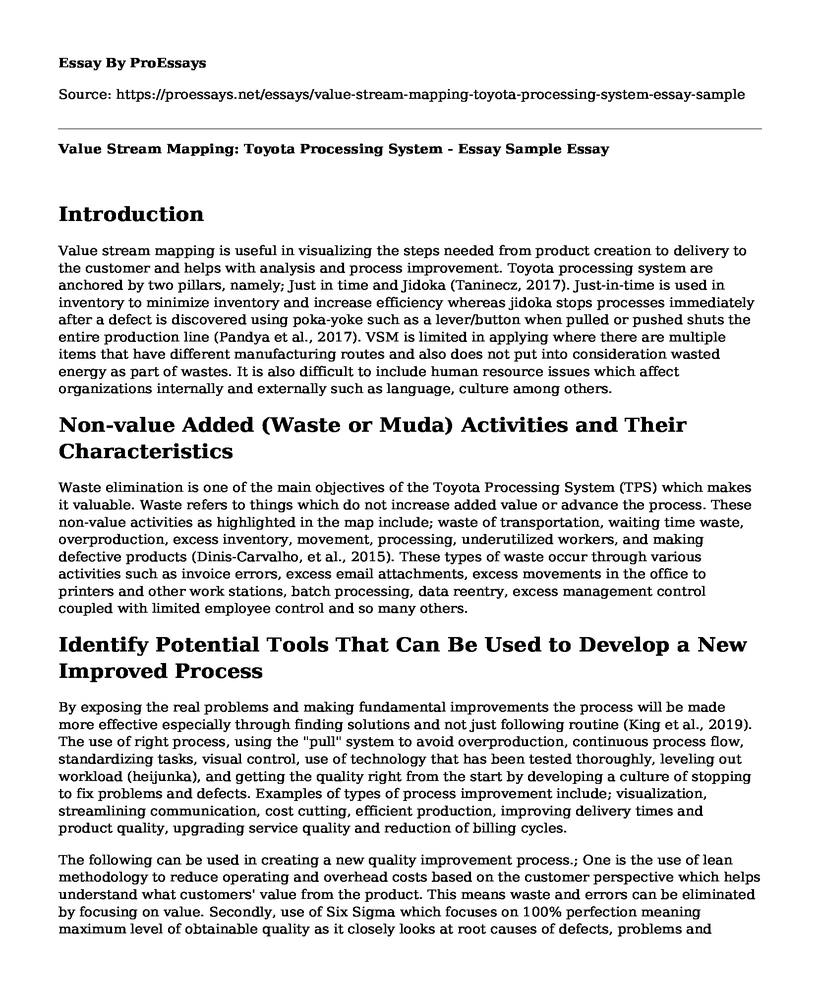Introduction
Value stream mapping is useful in visualizing the steps needed from product creation to delivery to the customer and helps with analysis and process improvement. Toyota processing system are anchored by two pillars, namely; Just in time and Jidoka (Taninecz, 2017). Just-in-time is used in inventory to minimize inventory and increase efficiency whereas jidoka stops processes immediately after a defect is discovered using poka-yoke such as a lever/button when pulled or pushed shuts the entire production line (Pandya et al., 2017). VSM is limited in applying where there are multiple items that have different manufacturing routes and also does not put into consideration wasted energy as part of wastes. It is also difficult to include human resource issues which affect organizations internally and externally such as language, culture among others.
Non-value Added (Waste or Muda) Activities and Their Characteristics
Waste elimination is one of the main objectives of the Toyota Processing System (TPS) which makes it valuable. Waste refers to things which do not increase added value or advance the process. These non-value activities as highlighted in the map include; waste of transportation, waiting time waste, overproduction, excess inventory, movement, processing, underutilized workers, and making defective products (Dinis-Carvalho, et al., 2015). These types of waste occur through various activities such as invoice errors, excess email attachments, excess movements in the office to printers and other work stations, batch processing, data reentry, excess management control coupled with limited employee control and so many others.
Identify Potential Tools That Can Be Used to Develop a New Improved Process
By exposing the real problems and making fundamental improvements the process will be made more effective especially through finding solutions and not just following routine (King et al., 2019). The use of right process, using the "pull" system to avoid overproduction, continuous process flow, standardizing tasks, visual control, use of technology that has been tested thoroughly, leveling out workload (heijunka), and getting the quality right from the start by developing a culture of stopping to fix problems and defects. Examples of types of process improvement include; visualization, streamlining communication, cost cutting, efficient production, improving delivery times and product quality, upgrading service quality and reduction of billing cycles.
The following can be used in creating a new quality improvement process.; One is the use of lean methodology to reduce operating and overhead costs based on the customer perspective which helps understand what customers' value from the product. This means waste and errors can be eliminated by focusing on value. Secondly, use of Six Sigma which focuses on 100% perfection meaning maximum level of obtainable quality as it closely looks at root causes of defects, problems and variations which reduce effectiveness (King, 2019). It calls for consistent improvements until the maximum level of perfection is achieved. Lastly, use of Top Quality Management which focuses on error elimination
Conclusion
Continuous process improvement is inevitable in business and can be done in different ways. By having discussions and sessions with employees and leaders, new ideas and perspectives can be collected to improve the workplace. Research should be done for time audits which can help in establishing the standards by which a task should be completed in future efficiently. To reduce slowdowns in production, monthly training programs to educate staff continually so they can rotate and fill any position as need be is necessary in case of sick-offs and vacation. Employees that work directly within the process can give insight on what improvements need to be done. Lastly, surveys done involving vendors, employees and customers can help understand the needed efforts for process improvement and what changes are required.
References
Dinis-Carvalho, Jose & Moreira, Francisco & Braganca, Sara & Costa, Eric & Alves, Anabela & Sousa, Rui. (2015). Waste identification diagrams. Production Planning and Control. 26. 235-247. Doi: 10.1080/09537287.2014.891059.
King, P. L. (2019). Lean for the process industries: dealing with complexity. CRC Press., Doi: 10.4324/9780429400155-5.pp.61-98
Pandya, N., Kikani, P., & Acharya, G. D. (2017). Analyze the Value Stream Mapping for Lead Time Reduction by Lean: A Review.
Taninecz, George .(2017). Industry Week ; Business And Economics--Marketing And Purchasing, Business And Economics-Management. Informa, Cleveland (Nov 11, 2017) http://ezproxy.sckans.edu/login?url=https://search.proquest.com/docview/1962636
Cite this page
Value Stream Mapping: Toyota Processing System - Essay Sample. (2023, May 18). Retrieved from https://proessays.net/essays/value-stream-mapping-toyota-processing-system-essay-sample
If you are the original author of this essay and no longer wish to have it published on the ProEssays website, please click below to request its removal:
- The Global Entrepreneurship and Development Index Methodology Analysis of Switzerland
- The Oil and Gas Industry Challenges in the Global Industry Research Paper Example
- Cafe Bateel's Readiness to Internationalize - Essay Sample
- Essay Example on Managing Costs in the Restaurant Business: The Essential Strategy
- Essay Example on equal Opportunities & Benefits: Techfite's Corporate Policy A & B
- Free Essay Sample on Ethical Compliance: Benefits for Companies and Society
- Report Example on New Belgium Brewing







